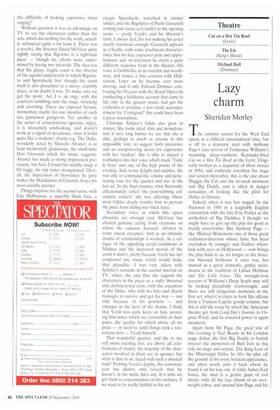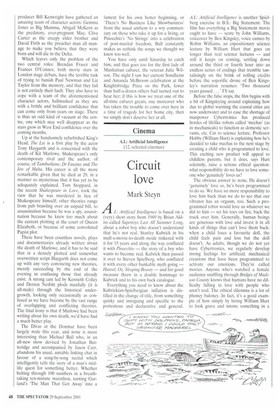Lazy charm
Sheridan Morley
The autumn season for the West End opens in a difficult international time, but is off to a dramatic start with Anthony Page's rare revival of Tennessee Williams's steaming, deep-southern, Kentucky-fried Cat on a Hot Tin Roof at the Lyric. Originally written as a sequence of short stories in 1954, and endlessly rewritten for stage and screen thereafter, this is the one about Maggie the Cat and the no-neck monsters and Big Daddy, and is often in danger nowadays of looking like the pilot for Dallas or Dynasty.
Indeed, when it was last staged, by the National in 1988 in a laughably English convention with the late Eric Porter as the unlikeliest of Big Daddies, I thought we might have to give up the play for good as locally unrevivable. But Anthony Page — like Michael Blakemore one of those great craftsmen-directors whose fame has been overtaken by younger and flashier whizzkids with eyes on Hollywood — now brings the play back to us, no longer as the threestar bisexual hothouse it once was, but instead as a great domestic, gothic melodrama in the tradition of Lillian Hellman and The Little Foxes. The wrought-iron screens of Williams's Deep South may still be looking dreadfully overwrought, and there are still dangerous moments in the first act. when Cat starts to look like offcuts from a Truman Capote gossip column, but this is still the route by which the American theatre got from Long Day's Journey to Virginia Woolf, and its restored power is again mesmeric.
Apart from Mr Page, the great star of this evening is Ned Beatty in his London stage debut, the first Big Daddy to banish forever the memories of Burl Ives in this role on stage and screen. The King Lear of the Mississippi Delta, he lifts the play off the ground at his every belated appearance, and often neatly puts it back where he found it on his way out. A white James Earl Jones, the man is a gentle giant of evil intent, with all the lazy charm of an overweight cobra, and around him Page and his producer Bill Kenwright have gathered an amazing team of character actors: Gemma Jones as Big Mamma, Abigail McKern as the predatory, ever-pregnant Mae, Clive Carter as the creepy elder brother and David Firth as the preacher man all manage to make you believe that they were born and will die in the Delta.
Which leaves only the problem of the two central roles: Brendan Fraser and Frances O'Connor, both movie stars in London stage debuts, have the terrible task of trying to banish Paul Newman and Liz Taylor from the memory, and that they fail is not entirely their fault. They also have to cope with a team of the aforementioned character actors, hallmarked as they are with a brittle and brilliant confidence that can come only from years on stage. There is thus an odd kind of vacuum at the centre, one which may well disappear as the stars grow in West End confidence over the coming months.
Up at the handsomely refurbished King's Head, The Lie is a first play by the actor Tony Haygarth and is concerned with the death of Kit Marlowe, Shakespeare's only contemporary rival and the author, of course, of Tamburlaine, Dr Faustus and The Jew of Malta. His career is all the more remarkable given that he died at 29, in a manner so mysterious that it has yet to be adequately explained. Tom Stoppard, in the recent Shakespeare in Love, took the view that he was murdered in lieu of Shakespeare himself; other theories range from pub brawling over an unpaid bill, to assassination because he was a spy, assassination because he knew too much about the current plotting at the court of Queen Elizabeth, or because of some convoluted Papist plot.
There have been countless novels, plays and documentaries already written about the death of Marlowe, and it has to be said that in a densely plotted and somewhat overwritten script Haygarth does not come up with any very convincing new theories, merely succeeding by the end of the evening in confusing those that already exist. A strong cast led by Kenneth Colley and Derren Nesbitt plods manfully (it is all-male) through the historical undergrowth, looking only occasionally as confused as we have become by the vast range of overlapping and conflicting theories. The final irony is that if Marlowe had been writing about his own death, we'd have had a much better play.
The Divas at the Donmar have been largely male this year, and none is more interesting than Michael Ball who, in an all-new show devised by Jonathan Butteridge and accompanied by Jason Carr, abandons his usual, amiable linking chat in favour of a song-by-song recital which intelligently tells the story of a man's midlife quest for something better. Whether belting through 100 numbers in a breathtaking ten-minute marathon, turning Garland's 'The Man That Got Away' into a lament for his own better beginning, or 'There's No Business Like Showbusiness' from the usual anthem to a wry commentary on those who take it up for a living, or Pinocchio's 'No Strings' into a celebration of post-marital freedom, Ball constantly makes us rethink the songs we thought we knew too well.
You have only until Saturday to catch him, and that goes too for the first lady of Manhattan cabaret, the veteran Julie Wilson. The night I saw her current Sondheim and Amanda McBroom celebration at the Knightsbridge Pizza on the Park, fewer than half-a-dozen others had turned out to hear her; if this is how we treat one of the all-time cabaret greats, one moreover who has taken the trouble to come over here in a time of tragedy for her home city, then we simply don't deserve her at all.







































































 Previous page
Previous page